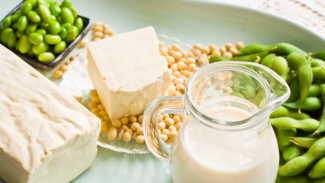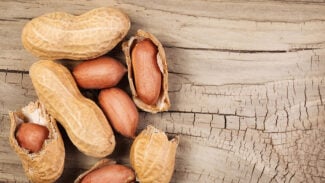Hiya Gorgeous
To eat soy or not to eat soy? Breast cancer and soy have had an “it’s complicated” type of relationship over the years, even though most minimally processed organic soy foods are considered safe and healthy to eat. Luckily, there’s growing research filled with great news! Today I’d like to walk you through it (and link you to it!) so you can take a look for yourself.
I want to unpack this research specifically for breast cancer thrivers—both current patients and anyone who is post-treatment—and then uncover what this means for breast cancer prevention too. If you’re curious about whether or not you should consume soy, then this is for you—knowledge is power, my friend!
Personally, I’ve made the choice to keep and enjoy organic soy in my diet. If you take a peek in my fridge, you’ll find a variety of whole and minimally-processed organic soy foods, such as edamame, tempeh, miso and tofu. These foods land on my plate 2-3 times per week. I made this choice because I’ve taken the time to understand the benefits of soy, I see they’re working for me, and my medical team has given me the green light. I’m also vegan and including organic, minimally processed soy in my diet (not the processed crap) provides more variety and protein options. There’s also just so many great dishes and recipes you can make that include healthy soy options!
Exploring the research and debunking common misconceptions can help you decide whether or not minimally-processed, organic soy is a good fit for you. As always, it’s important to follow your doctor’s advice. But if you’re wanting to include some soy in your world and your MD has given it the kibosh, you might want to alert your medical team to this soy and breast cancer research (check it out below!) Just because your doctor is a fabulous smarty pants, doesn’t always mean that he or she is up on all the nutrition studies. So let’s dig into these beautiful findings, thriving and prevention…
Breast Cancer Thriving and Soy
If you’re currently a breast cancer thriver, you may be feeling some confusion around soy. Many oncologists have been on the fence about whether or not women who have had breast cancer should consume soy foods. To play it safe, they’ve discouraged breast cancer thrivers from consuming soy.
The reason behind this is that soybeans contain weak estrogens, and these estrogen-like properties have raised concerns of potentially making the cancer grow in women with breast cancer. This is because in hormone receptor-positive cancer—the most common form of breast cancer—there are some worries that high estrogen levels help cancer cells grow and spread. But this remains very controversial. Oddly enough, most people are more fearful of soy than they are of dairy, which doesn’t have protective phytoestrogens and contains estrogen (with full-fat dairy products having the most estrogen).
In 2012, researchers took a look at the diets of nearly 10,000 breast cancer patients and what they found was worth noting—the women who consumed the most organic soy (at least ½ cup of edamame per day) had a 25 percent less chance of having a cancer recurrence compared to women who consumed little or no soy (study). But people and oncologists have still been on the fence….
Enter another study blessing soy for breast cancer thrivers
This study on soy and breast cancer (study abstract) included 6,235 American and Canadian breast cancer patients from the Breast Cancer Family Registry, a National Cancer Institute-funded program that has collected clinical and questionnaire data on participants since 1995. By looking at this diverse population of over 6,000 breast cancer patients, the researchers specifically analyzed their soy intake. And the results were pretty amazing. Here’s a summary of the top takeaways…
Higher Survival Rates
Eating foods rich in isoflavones (the specific phytoestrogens in soy foods) is associated with reduced all-cause mortality. More specifically, the researchers found a 21% decreased risk of death among women with the highest versus the lowest intake of soy foods. This was especially true in women with hormone-receptor-negative breast cancer (which is typically the more aggressive kind) and women not treated with hormone therapy.
Women in North America could benefit from increased organic soy consumption
Even though women living in North America had an overall low consumption of soy in their diet, they may still benefit from increasing their isoflavone intake to a higher level. This benefit may be for those thrivers who are not currently receiving hormone therapy, but there’s also no negative impact shown for those who are.
Increasing soy may increase survival rate after a cancer diagnosis
Here’s the absolute BEST news: recent diet is important! If you’ve been diagnosed with ER-negative breast cancer, soy may play a significant role in your survival, and may even matter more if you start eating it now than if you ate it way back when. So not only did this study find that soy wasn’t harmful for survival, but it actually may improve it. And while this study only found these specific perks for ER-negative survivors, previous research has found soy to be beneficial for ER-positive survivors and for both users and nonusers of hormone therapy (study). Happy dance!












My naturopath didn’t want me to consume soy at my age of 72 because it acts like a hormone. Is she correct? I also have am hypothyroid and take 30 mg of Nature Throid daily. It says in a book I have about thyroid issues to avoid beans, peanuts, kale, spinach, any cruciferous veggies unless they are cooked. I am a little confused. I probably should do what my Naturopath advises but I keep reading how healthy they are.
Great article, thnx!!! I like to eat some soy yoghurt sometimes, what’s your opinion on that?
I am Asian and I had breast cancer. And surrounding me are Asian ladies who have had breast cancer or who are doing treatments for it. So it’s not entirely true that eating soy products for us help prevent it. I strongly feel the rate of breast cancer among us Asians are on the rise! I ate soy products since young such as tofu, bean curd (the firmer ones), soy dessert, bean curd skin, bean curd puff, soya beans itself in soups, miso soup (Japanese source) but admittedly it’s not a daily affair that I eat them. I had hormone negative breast cancer and my oncologist says that is worse than hormone positive as it is further more mutated than the normal breast cells as compared to the hormone positive cancer. Anyway, I am staying clear of soy for now, as I journey to find healing for me body. There are lots of other good whole foods available for me. Cancer is really a multi-factored disease. x
Thank you for providing the information….. I’m also a breast cancer survivor and have been wondering about the soy connection since coming off dairy and looking for a new coffee creamer that is dairy free!! My only advise, that you didn’t ask for, is that all studies quoted be within 5 years. I am an Oncology RN, and I know it can be hard to find recent studies sometimes, but for me I probably would not make a change in lifestyle or professional practice based on 1 study, or on only studies that were from more than 5years ago. So thank you for providing several studies, including a meta analysis, you just shortened my research time!! Thanks, blessings!
Thank you for this very informative article. I’m a breast cancer thriver and am also confused about chick peas and sesame seeds as being possibly high in phyto estrogens. I’m vegan and cannot live without hummus and tahini salad dressings. Thoughts?
Hi Kris, Thank you for the great info! I am a two year BC thriver and this topic has certainly been on my mind. I’m curious if you have done any research on Maca? The little research I’ve done says this superfood is not recommend for those post BC. Thanks to you and your team!!
Hi Kris,
Thank you for the article. Dr. Michael Greger (book: How Not To Die, documentary: Cowspiracy, documentary: What the Health) has done some wonderful reviews of the science behind eating soy and breast cancer and I agree with both of you. Minimal processing, always organic, and variety. Thank you again for this article.
wow, That’s good to know.
Actually, I don’t really know the relationship between soy and breast cancer but my mom and my friends often say soy is good for your breast, it makes your breast becomes more bigger lol. But whatever it is, I love soy <3
My mom used to make soy milk when I still lived with my family. We've used soy in daily meals. It's just so good and delish.
Now I know more about its benefits so Yay, I will eat soy more xD Thanks for sharing!! 🙂
Hi Jen Reilly where are you and Kris located?
Breast cancer is highly common in women. After treatment still women have e chance of getting another breast cancer. read it and be saved.
Thanks for sharing such a awesome info. I would love to share it with my friends. Thanks Again.